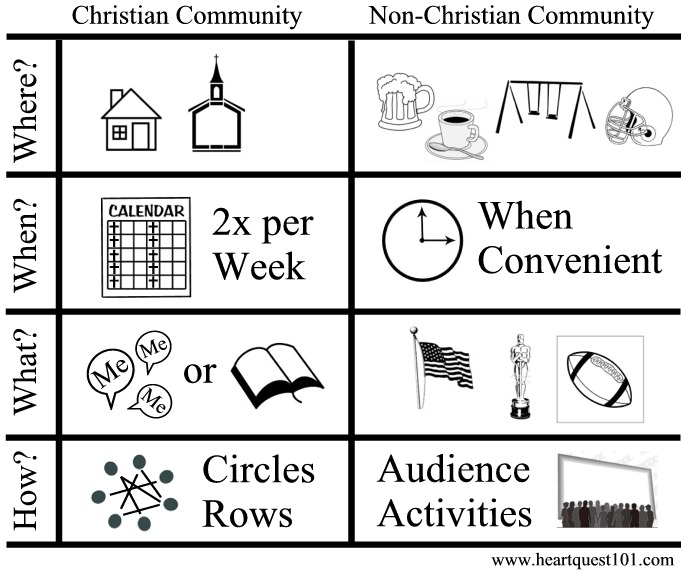This is a compelling talk on how we desire for lost people to get involved in small groups…
A missionary is one who sacrifices everything except the gospel for the sake of the gospel. How do we get people to think through that lens? How do we change their behavior?
How do people in church feel about community?
- Where? – Where does it happen? Generally at church or in a home.
- When? – On Sunday in worship or mid-week on Wednesdays.
- What? – What does the room look like? In a circle, face to face. Or perhaps rows.
- How? – The dominant view is that community is an event, and a place to go at a specific time. We gather to talk about God and we talk about his Word.
How do people in our community feel about community?
- Where? – Where do they get together? Sports bars, parks with kids, happy hour, concerts, going to places in the culture. They go to places typically not in their homes.
- When? – When do they get together? Generally not on a set time and day, but when it is convenient for their schedules..
- What? – What do they talk about? Food, health, dieting, sports, politics, kids, movies, activities, news, work, it is generally defined by the people and events in your life.
- How? – Do they gather in a circle? Likely not, but rather they walk or work side by side, at a concert, festival, cause, or an activity like the beach, bowling, or the recreation center.
These are fundamentally different: we try to invite people into forms and activities that we do, that are totally inconsistent with the lives that they lead.
Who is a missionary if all we do are these church things? If we desire to be missionaries, we have it backwards. We are often asking people who have no hope of salvation to go to place that they are totally uncomfortable going. We are asking people without the Holy Spirit to adapt to our schedule and programs. We are expecting THEM to learn the new language and culture!
How often do the form that we have actually accomplish the mission of God? We have great intention of being a missional people but or form contradicted our mission. So we need to create fresh expressions of ways to impact our society, to tool our people with tangible practices that empower the people of God to live out their faith in everyday life.
